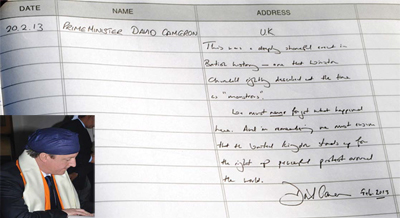
AMRITSAR (TIP): British PrimeMinister David Cameron visited the site ofa colonial-era massacre in India onFebruary 20, describing the episode as”deeply shameful” while stopping short of apublic apology.On the last leg of a three-day trip aimedat forging deeper economic ties, Camerontook the bold decision to visit the city ofAmritsar and tackle an enduring scar ofBritish rule on the subcontinent, whichended in 1947.Dressed in a dark suit and bowing hishead, he laid a wreath at the memorial tothe victims at Jallianwala Bagh, whereBritish troops opened fire on thousands ofunarmed protesters in 1919.In a message in the visitors’ book, hewrote: “This was a deeply shameful event inBritish history and one that WinstonChurchill rightly declared at the time as’monstrous’.
David Cameron at Jallianwala Bagh
“We must never forget what happenedhere. And in remembering we must ensurethat the United Kingdom stands up for theright of peaceful protest around the world.”The number of casualties at theJallianwala Bagh garden is unclear, withcolonial-era records showing about 400deaths while Indian figures put the numberkilled at closer to 1,000.Bhusan Behl, who heads a trust for thefamilies of victims, has campaigned fordecades on behalf of his grandfather whowas killed at the entrance to the walledarea.
He said he was hoping that Cameronwould say sorry for the slaughter orderedby General Reginald Dyer, which wasimmortalised in Richard Attenborough’sfilm Gandhi and features in SalmanRushdie’s epic book Midnight’s Children.The 1919 slaughter, known in India as theJallianwala Bagh massacre, was describedby Mahatma Gandhi, the father of theIndian independence movement, as havingshaken the foundations of the BritishEmpire.A group of soldiers opened fire on anunarmed crowd without warning in thenorthern Indian city after a period ofunrest, killing hundreds in cold blood.Cameron’s visit and expression of regretfor what happened will stop short of anapology – but will make it clear heconsiders the episode a stain on Britain’shistory that should be acknowledged.
The gesture, coming on the third andfinal day of a visit to India aimed atdrumming up trade and investment, islikely to be seen as an attempt to improverelations with Britain’s former colonialpossession and to court around 1.5 millionBritish voters of Indian origin ahead of a2015 election.Before his visit, Cameron said there wereties of history between the two countries,”both the good and the bad”.”In Amritsar, I want to take theopportunity to pay my respects atJallianwala Bagh,” he said, referring to thesite of the massacre.Cameron is expected to visit Amritsar’sGolden Temple, a place of pilgrimage forSikhs, and to inscribe his thoughts aboutthe killings in the visitor book.When asked to comment on Britain’scolonial past, he said: “I would argue it’s astrength, not a weakness. Of course thereare sensitive issues, sensitive events, butactually the fact that Britain and India havethis history, have a shared culture and ashared language, I think, is a positive.
“The British report into the Amritsarmassacre at the time said 379 people hadbeen killed and 1,200 wounded. But aseparate inquiry commissioned by theIndian pro-independence movement saidaround 1,000 people had been killed.Brigadier-General Reginald Dyer, theman who gave the order to fire, explainedhis decision by saying he felt it wasnecessary to “teach a moral lesson to thePunjab”.Some in Britain hailed him “as the manwho saved India”, but others condemnedhim. India became independent in 1947.Many historians consider the massacre aturning point that undermined British ruleof India.It was, they say, one of the moments thatcaused Gandhi and the pro-independenceIndian National Congress movement to losetrust in the British, inspiring them toembark on a path of civil disobedience.
“Monstrous event”
Other British politicians and dignitaries- though no serving prime minister – haveexpressed regret about the incident before.In 1920, Winston Churchill, then thesecretary of state for war, called theAmritsar massacre “a monstrous event”,saying it was “not the British way of doingbusiness”.On a visit to Amritsar in 1997, QueenElizabeth called it a distressing episode, butsaid history could not be rewritten.However, her husband, Prince Philip,courted controversy during the visit whenhe questioned the higher Indian death toll.Before he became prime minister, TonyBlair also visited, saying the memorial atAmritsar was a reminder of “the worstaspects of colonialism”.
In recent years, British leaders havebegun to apologise for some of the excessesof Empire.Visiting Pakistan in 2011, Cameronangered traditionalists at home sayingBritain had caused many of the world’sproblems, including the Kashmir conflictbetween India and Pakistan.When in office, Blair apologised for the19th century Irish potato famine and forBritain’s involvement in the slave trade,while Gordon Brown, his successor,apologised for the fact that British childrenwere shipped to Australia and otherCommonwealth countries between the1920s and 1960s.Britain ruled or held sway in India viathe British East India company from the17th century until 1947.
India’s colonial history remains asensitive subject for many Indians,particularly nationalists who want Britainto recognise and apologise for its excesses.Others believe bygones should bebygones.”What happened in the past happened inthe past,” Aamir Khan, Bollywood film star,told reporters after a meeting withCameron on Tuesday.”I don’t think we can hold the presentgeneration of Britishers responsible forwhat happened ages ago. It is not fair. Idon’t think that they owe us an apology forwhat happened a century ago.”Cameron has said the two countriesenjoy a “special relationship”, a termusually reserved for Britain’s relations withthe United States, but it is a relationshipundergoing profound change.For now, Britain’s economy is the sixthlargest in the world and India’s the 10th.But India is forecast to overtake its oldcolonial master in the decades ahead andLondon wants to share in that economicsuccess.





Can I just say what a aid to find somebody who truly knows what theyre speaking about on the internet. You definitely know methods to deliver a problem to mild and make it important. Extra people must read this and perceive this facet of the story. I cant imagine youre not more fashionable because you positively have the gift.
Heya i’m for the first time here. I came across this board and I find It really useful & it helped me out a lot. I hope to give something back and help others like you helped me.
Very interesting points you have remarked, thankyou for posting.
I saw a lot of website but I think this one contains something extra in it in it
fantastic post.Never knew this, appreciate it for letting me know.
Hi! Do you use Twitter? I’d like to follow you if that would be ok. I’m definitely enjoying your blog and look forward to new posts.
Hey very nice blog!! Man .. Excellent .. Amazing .. I will bookmark your website and take the feeds also…I am happy to find numerous useful info here in the post, we need work out more strategies in this regard, thanks for sharing. . . . . .
Very interesting info!Perfect just what I was searching for!
Thank you for the auspicious writeup. It in fact was a amusement account it. Look advanced to more added agreeable from you! However, how can we communicate?
What i do not understood is in reality how you’re no longer really a lot more smartly-liked than you might be now. You are very intelligent. You already know thus considerably when it comes to this subject, produced me personally imagine it from a lot of various angles. Its like women and men aren’t interested except it’s one thing to accomplish with Woman gaga! Your own stuffs outstanding. Always handle it up!
Hi! Quick question that’s totally off topic. Do you know how to make your site mobile friendly? My web site looks weird when viewing from my iphone4. I’m trying to find a theme or plugin that might be able to fix this problem. If you have any suggestions, please share. Cheers!
I’ve recently started a site, the info you provide on this site has helped me tremendously. Thanks for all of your time & work.
I carry on listening to the newscast speak about receiving free online grant applications so I have been looking around for the top site to get one. Could you tell me please, where could i find some?
you’re really a good webmaster. The site loading speed is incredible. It seems that you’re doing any unique trick. Furthermore, The contents are masterpiece. you’ve done a wonderful job on this topic!
Hello, i think that i saw you visited my web site so i came to “return the favor”.I am trying to find things to enhance my web site!I suppose its ok to use some of your ideas!!
Way cool, some valid points! I appreciate you making this article available, the rest of the site is also high quality. Have a fun.
hello!,I like your writing so much! share we communicate more about your article on AOL? I require an expert on this area to solve my problem. Maybe that’s you! Looking forward to see you.
I got what you intend,saved to favorites, very nice website .
After all, what a great site and informative posts, I will upload inbound link – bookmark this web site? Regards, Reader.
It is really a nice and helpful piece of information. I?¦m happy that you simply shared this helpful info with us. Please stay us informed like this. Thank you for sharing.
Hi, i feel that i saw you visited my website thus i came to “go back the want”.I am trying to to find issues to improve my web site!I assume its good enough to use some of your ideas!!
Hiya very nice website!! Guy .. Excellent .. Wonderful .. I’ll bookmark your web site and take the feeds also?KI’m satisfied to seek out a lot of helpful information right here in the put up, we want develop extra techniques in this regard, thanks for sharing. . . . . .
I have been exploring for a little for any high-quality articles or blog posts in this sort of area . Exploring in Yahoo I eventually stumbled upon this website. Studying this information So i¦m happy to show that I’ve a very good uncanny feeling I discovered exactly what I needed. I most certainly will make sure to do not put out of your mind this site and provides it a glance regularly.
I’ll immediately grab your rss as I can’t find your e-mail subscription link or newsletter service. Do you have any? Please let me know in order that I could subscribe. Thanks.